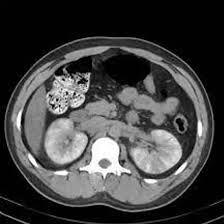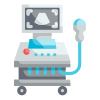Fill out form to enquire now
MRI for Nephrogram Scan
Medintu has collaborated with the best pathology laboratories that are NABL and NABH certified and follow ISO safety guidelines to provide the best MRI for Nephrogram Scan at an affordable price for needy individuals. An MRI Nephrogram Scan is a highly advanced imaging technique used to visualize the kidneys and surrounding structures in detailed cross-sectional images. This non-invasive procedure uses a magnetic field and radio waves to create high-resolution images of the kidneys, blood vessels, and tissues, without the use of harmful radiation. It is particularly effective in assessing kidney health, diagnosing kidney diseases, and detecting abnormalities such as tumors, cysts, kidney stones, and vascular issues. Unlike other imaging methods such as CT scans, an MRI nephrogram scan offers a clear view of the kidneys and can capture subtle changes in kidney function or structure. This makes it an invaluable tool in both the diagnosis and monitoring of various kidney conditions, from early-stage diseases to more complex issues requiring detailed evaluation. Whether you’re undergoing an MRI nephrogram scan as part of a routine check-up, diagnostic workup, or post-treatment monitoring, the procedure provides valuable information to guide your healthcare provider in making accurate diagnoses and recommending effective treatments.
To schedule an appointment for a MRI for Nephrogram Scan, simply contact Medintu or call our customer care at +919100907036 or +919100907622 for more details and queries.
Why MRI Nephrogram Scan is Used?
An MRI Nephrogram Scan is a specialized imaging test used to evaluate and diagnose various kidney-related conditions. Below are some key reasons why an MRI Nephrogram scan is used:
- Detecting Kidney Cancer
Accurate Tumor Imaging: MRI nephrograms are highly effective for detecting kidney tumors and cancers, such as renal cell carcinoma. The detailed images produced by MRI can clearly show the size, location, and extent of a tumor.
- Evaluating Kidney Cysts and Polycystic Kidney Disease (PKD)
Identifying Kidney Cysts: MRI can identify simple or complex kidney cysts and help monitor their size and progression over time.
- Assessing Kidney Function and Blood Flow
Renal Artery Stenosis: MRI nephrograms are used to assess the health of the renal arteries—the blood vessels that supply the kidneys. Renal artery stenosis (narrowing of these arteries) can lead to kidney damage and high blood pressure.
- Diagnosing Kidney Infections and Inflammation
Infections and Abscesses: MRI can help detect kidney infections or abscesses, which may not always be visible on ultrasound or other imaging techniques.
- Investigating Kidney Stones and Their Complications
Assessing Complications of Kidney Stones: Although MRI is not the primary imaging tool for detecting kidney stones, it can be used to assess complications related to stones.
- Detecting Vascular Abnormalities
Renal Vascular Malformations: MRI nephrograms are useful for detecting renal vascular malformations, such as abnormal connections between blood vessels.
- Guiding Kidney Biopsy and Surgical Planning
Precise Biopsy Guidance: When a biopsy is required to diagnose a kidney tumor or condition, MRI can provide real-time guidance to ensure the biopsy needle is accurately placed in the area of concern.
- Monitoring Chronic Kidney Disease (CKD) and Progression
Assessing Disease Progression: For patients with chronic kidney disease (CKD) or other long-term kidney conditions, MRI can be used to monitor the progression of the disease over time.
- Evaluating Kidney Transplants
Post-Transplant Monitoring: For individuals who have received a kidney transplant, MRI is used to monitor the health of the transplanted kidney.
How MRI Nephrogram Scan Works?
An MRI Nephrogram Scan is a sophisticated imaging procedure that uses Magnetic Resonance Imaging (MRI) technology to create detailed, high-resolution images of the kidneys and surrounding structures. Here’s a breakdown of how the MRI Nephrogram Scan works:
- MRI Technology: Magnetic Fields and Radio Waves
MRI scans work by utilizing strong magnetic fields and radio waves. These components interact with the hydrogen atoms in the body, which are abundant in water molecules (and therefore in tissues like kidneys).
- The Role of the Nephrogram in Imaging the Kidneys
The term “nephrogram” refers to a specific imaging technique used to create detailed pictures of the kidneys, their blood vessels, and their surrounding structures. When an MRI nephrogram is performed, the focus is on the renal anatomy, including the kidneys, renal arteries, veins, and the surrounding tissue.
- Contrast Agents: Enhancing Image Clarity
In many cases, a contrast agent (typically gadolinium) is injected into the bloodstream to enhance the quality of the images. This contrast dye helps to highlight blood vessels and abnormal tissue, allowing for a more detailed and clearer view of kidney function and structure.
- What Types of Information Does the MRI Nephrogram Provide?
MRI nephrograms provide a wealth of information to help healthcare providers diagnose kidney conditions:
Structural Information: The MRI provides detailed images of kidney size, shape, and structure, helping to identify tumors, cysts, or signs of kidney disease.
Soft Tissue Visualization: MRI gives an excellent view of soft tissues, such as kidney parenchyma (the functional tissue), allowing for a clear view of conditions like kidney infections, inflammation, or scarring.
- Advantages of MRI Nephrogram Scan
Non-Invasive and No Radiation: MRI is a non-invasive imaging technique and does not use radiation, making it a safer option for many patients, especially those requiring multiple scans over time.
High-Resolution Images: MRI provides extremely detailed images, allowing for better detection and evaluation of kidney-related issues.
Benefits of MRI Nephrogram Scan
An MRI Nephrogram Scan offers numerous advantages for evaluating and diagnosing kidney-related conditions. Below are the key benefits of an MRI Nephrogram Scan:
- Non-Invasive and Radiation-Free
No Radiation Exposure: Unlike CT scans or X-rays, an MRI nephrogram does not involve the use of ionizing radiation, making it a safer option for patients, particularly for those who require multiple scans over time.
Non-Invasive Procedure: The MRI nephrogram is a non-invasive imaging technique, meaning there is no need for surgical incisions or invasive procedures.
- High-Resolution Imaging
Clear, Detailed Images: MRI nephrograms provide high-resolution images of the kidneys, blood vessels, and surrounding tissues. This level of detail allows doctors to accurately diagnose and assess conditions such as tumors, cysts, vascular issues, and kidney disease.
- Early Detection of Kidney Issues
Detects Early-Stage Diseases: MRI nephrogram scans are highly effective for detecting early-stage kidney problems, including tumors, cysts, and abnormal growths, at their most treatable stages.
- Detailed Assessment of Kidney Function
Kidney Blood Flow: MRI nephrograms provide critical information about blood flow to and from the kidneys. This is particularly helpful in diagnosing and evaluating conditions like renal artery stenosis.
- Comprehensive Visualization of Kidneys and Surrounding Structures
Blood Vessels and Vascular Abnormalities: MRI nephrograms can clearly visualize the renal vasculature, including arteries, veins, and smaller blood vessels. This is crucial for detecting vascular abnormalities, such as aneurysms, malformations, or blockages in the renal arteries.
- Guiding Treatment and Surgery
Pre-Surgical Planning: MRI nephrogram scans are essential tools for planning kidney-related surgeries, including tumor removals or kidney transplants. Detailed imaging of the kidneys and surrounding blood vessels helps surgeons accurately locate abnormalities and plan the best course of action.
- Monitoring Kidney Transplants
Post-Transplant Monitoring: MRI is valuable for patients who have undergone a kidney transplant. The scan can monitor the health of the transplanted kidney, detect signs of rejection, infections, or complications related to blood flow, and help ensure the transplant is functioning properly.
Common Conditions Diagnosed with MRI Nephrogram Scan
An MRI Nephrogram Scan is an advanced imaging technique that provides detailed and high-resolution images of the kidneys, blood vessels, and surrounding tissues. Below are some of the most common conditions that can be diagnosed with an MRI Nephrogram Scan:
- Kidney Cancer
Renal Cell Carcinoma (RCC): MRI is highly effective in detecting and staging renal cell carcinoma, the most common type of kidney cancer. The scan can clearly show the size, location, and spread of the tumor, providing crucial information for surgical planning and treatment decisions.
- Kidney Cysts
Simple Cysts: MRI can differentiate between simple cysts (fluid-filled sacs) and more concerning masses, such as tumors. Simple cysts are typically benign, but MRI can provide clear images to monitor their size and any potential complications.
- Renal Artery Stenosis
Narrowing of the Renal Arteries: MRI nephrograms are invaluable for detecting renal artery stenosis, a condition in which the arteries supplying blood to the kidneys become narrowed. This narrowing can cause high blood pressure and kidney damage.
- Kidney Infections (Pyelonephritis)
Acute and Chronic Infections: MRI is useful for detecting kidney infections (pyelonephritis), especially in complicated or severe cases. It can identify areas of inflammation or abscesses in the kidneys that may not be visible with other imaging methods.
- Kidney Stones and Related Complications
Kidney Stones: While MRI is not typically used as the first-line method for detecting kidney stones, it can help assess complications related to kidney stones, such as obstruction, infection, or damage to kidney tissue caused by stones lodged in the urinary tract.
- Chronic Kidney Disease (CKD)
Kidney Function Monitoring: MRI is an effective tool for monitoring the progression of chronic kidney disease (CKD). By assessing changes in kidney size, tissue structure, and blood flow over time, doctors can track the progression of CKD and make adjustments to treatment plans as necessary.
- Renal Vein Thrombosis
Blood Clot in Renal Veins: MRI can identify renal vein thrombosis, a condition where a blood clot forms in the vein that drains blood from the kidney. This can lead to kidney damage and decreased kidney function. MRI is useful for diagnosing this condition and evaluating its severity.
Preparation for Your MRI Nephrogram Scan
Preparing for an MRI Nephrogram Scan is essential to ensure the procedure goes smoothly and the images are clear, but here’s a general guide to help you get ready for your MRI nephrogram scan:
- Consult with Your Doctor
Discuss Health History: Before scheduling your MRI, it’s important to discuss your health history with your doctor. Inform them of any medical conditions, allergies, or medications.
- Fasting and Dietary Instructions
Hydration: Make sure to drink plenty of fluids before your appointment. Staying hydrated can help improve the clarity of your scan, especially when imaging your kidneys and surrounding structures.
No Food or Drink Before the Procedure: If fasting is required, you will be instructed not to eat or drink anything after midnight or a few hours before your scheduled MRI time.
- Clothing and Personal Items
Wear Comfortable Clothing: On the day of your MRI, wear loose, comfortable clothing with no metal parts. Metal can interfere with the MRI machine’s magnetic field and affect the quality of the images.
- Preparing for the MRI Procedure
Arriving Early: Arrive at the imaging center or hospital at least 15–30 minutes before your scheduled appointment. This gives you time to fill out any necessary forms and to review any additional instructions with the MRI staff.
Changing into a Gown: Depending on the facility, you may be asked to change into a hospital gown for the scan. This ensures that no clothing or metal interferes with the MRI scan.
- During the MRI Nephrogram Scan
Positioning on the Table: Once you’re ready, you’ll lie on your back on the MRI table. For the nephrogram scan, your abdomen will usually be positioned in the middle of the scanner.
Duration: The MRI nephrogram scan usually lasts between 30 to 60 minutes, depending on the complexity of the scan and whether contrast is used.
- Test Type: MRI for Nephrogram Scan
- Preparation:
- Wear a loose-fitting cloth
- Fasting not required
- Carry Your ID Proof
- Prescription is mandatory for patients with a doctor’s sign, stamp, with DMC/HMC number; as per PC-PNDT Act
- Reports Time: With in 4-6 hours
- Test Price: Rs.4000
How can I book an appointment for an MRI for Nephrogram Scan through Medintu?
To schedule an appointment for an MRI for Nephrogram Scan, simply contact Medintu or call our customer care at +919100907036 or +919100907622 for more details and queries.
What is an MRI Nephrogram Scan?
An MRI Nephrogram Scan is an advanced imaging technique that uses magnetic resonance imaging (MRI) to create detailed images of the kidneys, blood vessels, and surrounding structures. It is often used to diagnose and monitor conditions such as kidney tumors, cysts, infections, vascular abnormalities, and kidney disease.
Why do I need an MRI Nephrogram Scan?
Your doctor may recommend an MRI nephrogram if you have symptoms such as pain in the lower back or abdomen, changes in urine, or if you are at risk of kidney-related conditions. It is particularly useful for diagnosing kidney cancer, chronic kidney disease (CKD), kidney cysts, and other abnormalities. It is also used for monitoring kidney function in patients with conditions like hypertension or diabetes.
Is the MRI Nephrogram Scan safe?
Yes, an MRI nephrogram scan is generally considered safe. It does not involve the use of radiation, which makes it a safer option than other imaging methods like CT scans or X-rays. However, it’s important to inform your healthcare provider if you have any metal implants, pacemakers, or other medical devices, as these can interfere with the MRI machine’s magnetic field.
What is contrast dye, and do I need it for my MRI?
Contrast dye (gadolinium) is a substance injected into your veins to enhance the MRI images and make certain structures, like blood vessels and tumors, more visible. Not all MRI nephrograms require contrast, but your doctor may recommend it if they need more detailed images of your kidneys, blood flow, or any abnormal growths. If contrast is used, you will be injected with it through an IV during the procedure.
How long does the MRI Nephrogram Scan take?
The MRI nephrogram scan typically takes between 30 to 60 minutes. If contrast dye is used, the procedure may take slightly longer. During this time, it’s important to remain as still as possible to ensure clear and accurate images.
Do I need to fast before the MRI Nephrogram Scan?
Fasting may be required if contrast dye is being used. Generally, patients are asked not to eat or drink anything for 4 to 6 hours before the scan. This helps reduce the risk of nausea or discomfort during the contrast injection. Your healthcare provider will give you specific instructions based on your situation.
What should I wear for the MRI Nephrogram Scan?
Wear loose, comfortable clothing with no metal objects like zippers, jewelry, or buttons. You may be asked to change into a hospital gown for the procedure to avoid any interference from metal items in your clothing.
Why Choose Medintu for MRI for Nephrogram Scan?
Medintu is an online medical consultant that provides home-based medical services not only in your area but also in most cities in India, including Hyderabad, Chennai, Mumbai, Kolkata, and more. We have collaborated with diagnostic centers that have the best machines and equipment to ensure you get accurate results. Medintu provides 24-hour customer service for booking the appointment of the services and guides you with instructions. Medintu also provides the best diagnostic centers at low prices. Once you receive your test results, you can easily book an appointment with our network of experienced doctors for consultation. To schedule an appointment for an MRI for Nephrogram Scan, simply contact Medintu or call our customer care at +919100907036 or +919100907622 for more details and queries.





